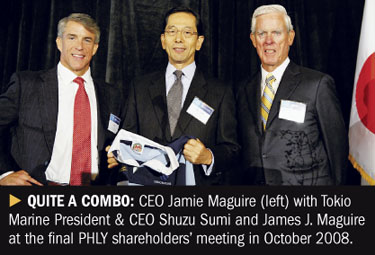 When Tokio Marine Holdings Inc.announced it would acquire Philadelphia Consolidated Holding Corp.for $4.8 billion in July 2008—near the height of the globaleconomic meltdown—market-watchers were impressed but not overlysurprised at the hefty price tag. Some four years on, many agree,the deal still looks smart.
When Tokio Marine Holdings Inc.announced it would acquire Philadelphia Consolidated Holding Corp.for $4.8 billion in July 2008—near the height of the globaleconomic meltdown—market-watchers were impressed but not overlysurprised at the hefty price tag. Some four years on, many agree,the deal still looks smart.
Robert Farnam, senior vice president of equity research withKeefe, Bruyette & Woods, says that Philadelphia had beenshopping itself around for a while prior to the sale.
|“It was fairly expensive on a price-to-book basis, but thecompany was doing a lot of things right, and I had an ‘out-perform’on it at the time,” Farnam recalls. “Tokio paid a lot for it upfront, but they had a long-term view.”
|Part of that view was informed by Tokio’s desire to grow itsP&C markets, which is increasingly difficult to do insideJapan, observes Reina Tanaka, associate director offinancial-institutions ratings at Standard & Poor’s Japan.
|For Philadelphia, Tokio provides an opportunity to win newclients. “It has been an outstanding fit, and it would haveprobably taken us 15 years to get where we are without them,” saysPresident & COO Sean Sweeney.
|For instance, Philadelphia recently partnered with itsLondon-based sister company, Kiln Group, for underwriting expertiseon a Cyber Liability product.
|Tokio’s financial strength is another benefit. PhiladelphiaConsolidated’s investment portfolio tops $5.5 billion, according toCraig Keller, executive vice president, treasurer, secretary andCFO. Prior to the acquisition, a little more than 11 percent hadbeen invested in common stocks but, in keeping with Tokio’sstrategy, Philadelphia divested these interests and municipal bondsnow comprise 65 percent of its portfolio.
|“Bonds are less volatile and have performed well in the last fewyears,” observes Taoufik Gharib, a director of Standard &Poor’s. “Philadelphia has a conservative investment strategy, andTokio provides them with a stable capital base for growth.”
|A.M. Best, which upgraded Philadelphia from A+ to A++ lastSeptember, cited the Pennsylvania-based carrier’s strongcapitalization and cash flow—and also cited the financial strengthof Tokio Marine.
|The makeup of Philadelphia’s senior management team has changedlittle since the merger. The only major change came with theretirement of company founder James “Jamie” Maguire Sr. His son,Jamie Jr., succeeded him as chairman & CEO. President & COOSweeney is his nephew.
|“Many companies have an anti-nepotism policy,” says Sweeney. “Wehave a pro-nepotism policy, but only for high achievers: If you’refamily and you’re not performing, we’ll fire you.”
|Luckily, he adds, that hasn’t happened at the executive levelwhere, excluding retirements, there’s been zero turnover in thepast 15 years.
Want to continue reading?
Become a Free PropertyCasualty360 Digital Reader
Your access to unlimited PropertyCasualty360 content isn’t changing.
Once you are an ALM digital member, you’ll receive:
- All PropertyCasualty360.com news coverage, best practices, and in-depth analysis.
- Educational webcasts, resources from industry leaders, and informative newsletters.
- Other award-winning websites including BenefitsPRO.com and ThinkAdvisor.com.
Already have an account? Sign In
© 2024 ALM Global, LLC, All Rights Reserved. Request academic re-use from www.copyright.com. All other uses, submit a request to [email protected]. For more information visit Asset & Logo Licensing.








